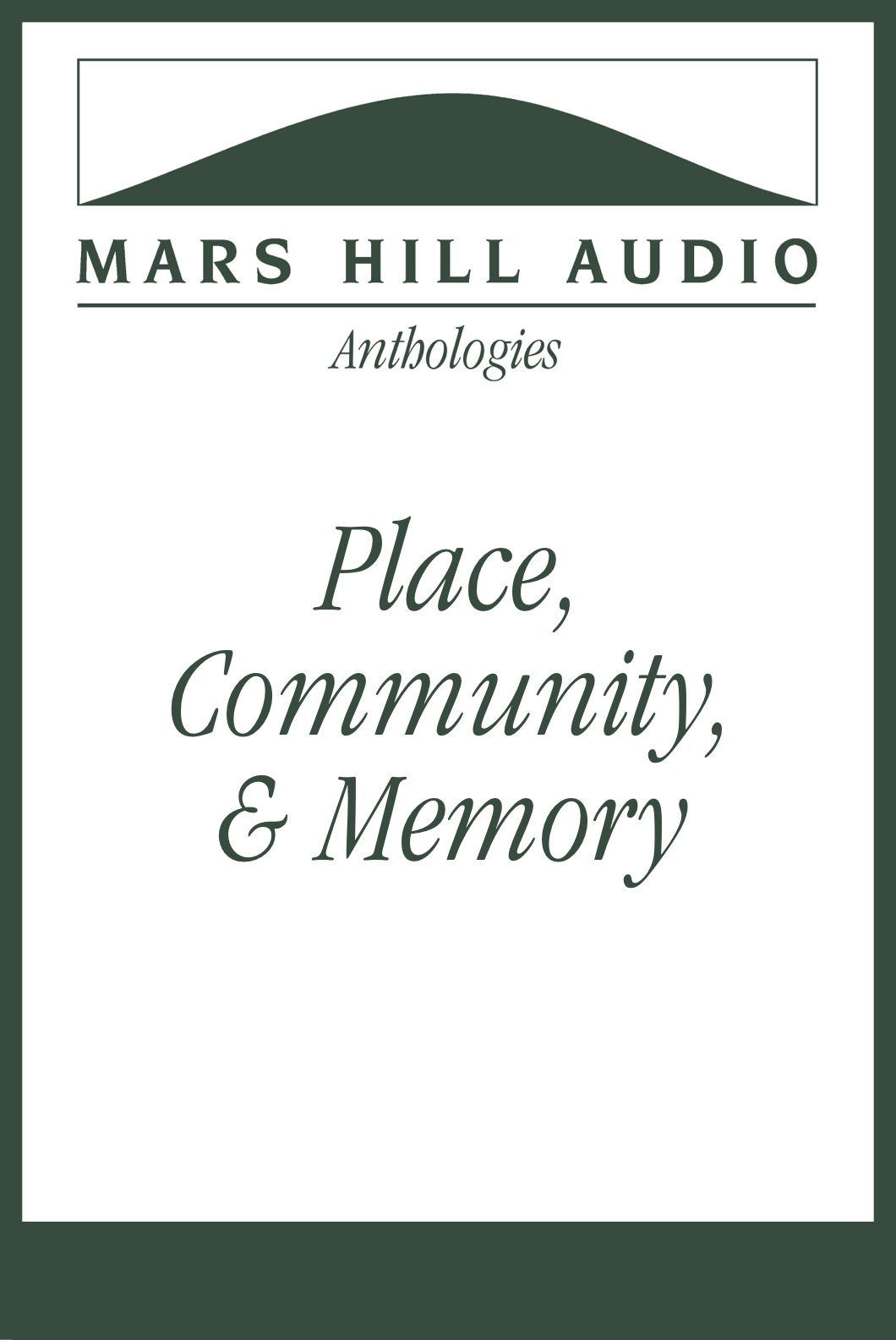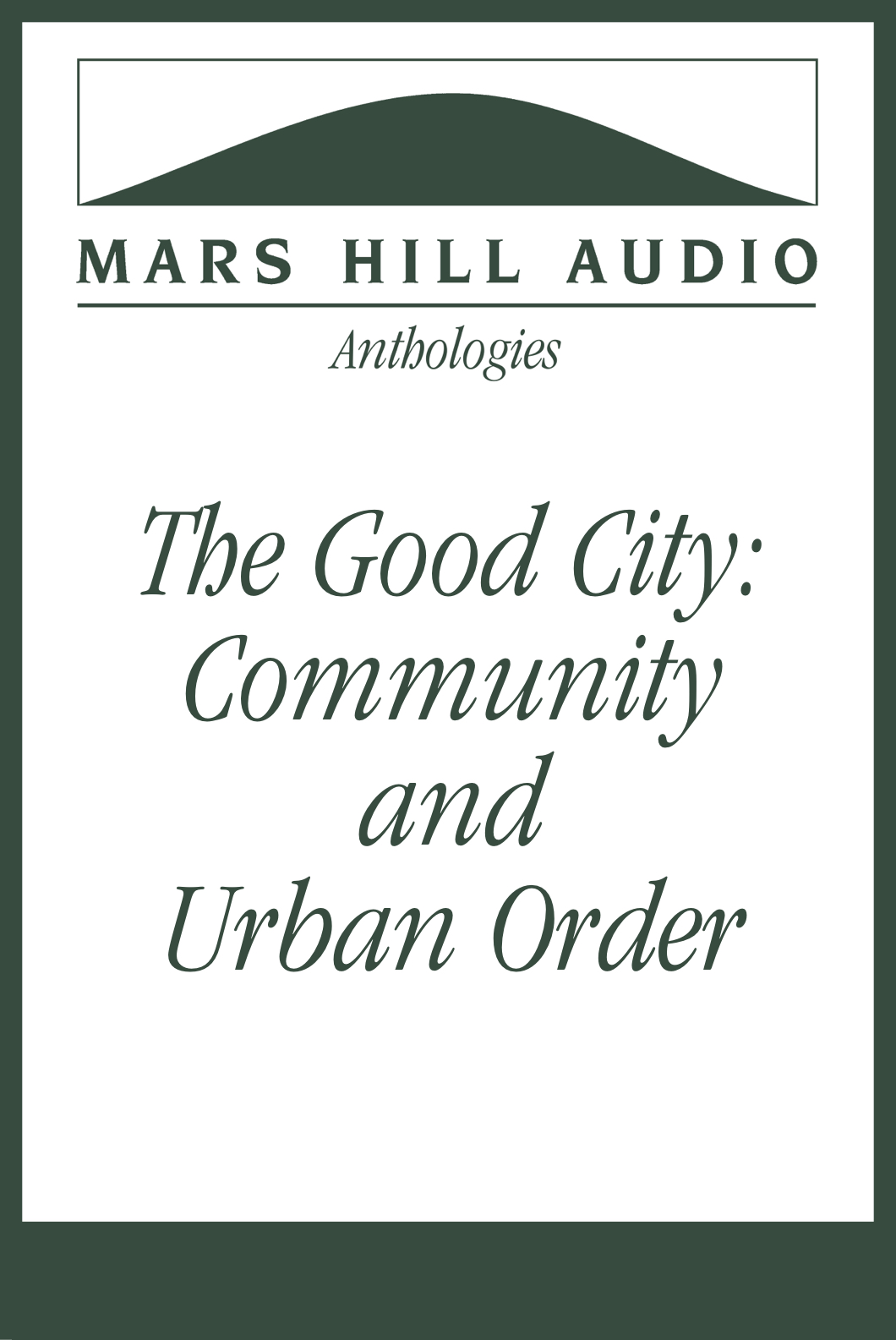
released 1/1/2000
What is the price of modern rootlessness? Is it possible to sustain community and local memory in an age when place seems to matter so little? In this Anthology, essays by Gina Bria, Wendell Berry, and Gilbert Meilaender, and the fiction of Bosnian novelist Ivo Andric explore the important ways in which we (and the communities we inhabit) are shaped and sustained by the particular places in which we live.
100 minutes
PREVIEW
The player for the full version of this Anthology is only available to listeners with a legacy account. If you have an legacy account for this Anthology, log in here. If you’d like to become a member — with access to many hours of audio programs — sign up here.
More to hear . . .
In this Anthology, Ken Myers interviews seven guests — architects, geographers, and historians and clergy — about the nature of good urban environments, about how loving our neighbors can and must take shape in how we order the material aspects of shared life. The conversations on this Anthology give particular attention to how the New Urbanist movement has challenged the dehumanizing effects of modernism in urban design.
This feature is available to listeners with a Mars Hill Audio membership.
Related reading and listening
- The collapse of public life —
FROM VOL. 154 D. C. Schindler explains how liberalism sought to make way for individuals to function together without any orientation to an explicit common good. (37 minutes) - A poet’s relationship to time —
FROM VOL. 57 Poet Wilmer Mills (1969–2011) discusses how his agricultural and cross-cultural childhood in Brazil shaped his imagination and his relationship with modernity. (11 minutes) - The personal element in all knowing — Mark Mitchell connects key aspects of Michael Polanyi’s conception of knowledge with Matthew Crawford’s insistence that real knowing involves more than technique. (34 minutes)
- Gratitude and stewardship as political postures —
FROM VOL. 118 Mark Mitchell explores the consequences of four concepts that are sadly missing from most political debates today: creatureliness, gratitude, human scale, and place. (18 minutes) - An embedded life — Following a move from one state to another, Gilbert Meilaender explores the tension between being simultaneously a sojourner and a body located in place and time. (30 minutes)
- Impact of “infotainment” on community — Neil Gabler and C. John Sommerville discuss how the mentalities conveyed by our experience with communications media work against the nurturing of community. (36 minutes)
- On the Degeneration of Attentiveness — Critic Nicholas Carr talks about how technology-driven trends affect our cultural and personal lives. (56 minutes)
- The digital revolution and community —
FROM VOL. 7 Ken Myers talks with Jane Metcalfe, the founder of WIRED Magazine, about technology and community. (8 minutes) - Education that counters alienation — In this lecture, Jeanne Schindler explores how digital technologies warp not only education but our experience of being human. (30 minutes)
- Courtesy as a theological issue —
FROM VOL. 37 Donald McCullough discusses his insights into the increasingly coarse nature of society and the theological foundations for courtesy. (12 minutes) - Only a dying civilization neglects its dead — Historian Dermot Quinn discusses the work of fellow historian Christopher Dawson (1889–1970). (15 minutes)
- Christopher Dawson: Chronicler of Christendom’s Rise and Fall — Dermot Quinn discusses historian Christopher Dawson’s meta-historical perspective and his wisdom about what makes cultures healthy or unhealthy. (54 minutes)
- The historian’s communal role as storyteller —
FROM VOL. 127 Historian Christopher Shannon discusses how American academic historical writing presents a grand narrative of progressivism, which it defends by subscribing to an orthodoxy of objective Reason. (21 minutes) - Friendship and life together — In a lecture at Providence College, Ken Myers explores how the concept of friendship, which used to be central to political philosophy, was banished from considerations of public life as the state was exalted over society. (53 minutes)
- A prophetic pilgrim — Historian Eric Miller charts Christopher Lasch’s intellectual journey in search of a vision that could direct Americans toward the higher hopes and nobler purposes that might lead to a flourishing common life. (57 minutes)
- Blest be the ties of language that bind us — Marion Montgomery on the precious gift of words
- The academy’s deconstruction of both person and community — Marion Montgomery on cultivating “a deportment of intellect governed by a continuing concern for the truth of things”
- Community, the giver of freedom — Thomas H. Naylor and William H. Willimon on why suspicion about big government shouldn’t take the form of autonomous individualism
- Where mortals dwell —
FROM VOL. 113 Theologian Craig Bartholomew provides a biblically rich critique of the contemporary “crisis of place,” a disorienting condition caused by neglect of the meaning of our embodiment. (21 minutes) - Place and imagination — Matthew Stewart on Wallace Stegner’s moral laboratories
- Welcoming one another — Christine Pohl describes the practice of hospitality in Church history and the particular challenges to hospitality we face in our era. (30 minutes)
- Convivial is beautiful — Ivan Illich on “the opposite of industrial productivity”
- Loving relationships in community — In conversation with moral philosopher Oliver O’Donovan, and with readings from his book, Entering into Rest, Ken Myers explores a central theme in O’Donovan’s work: that we are created to enjoy loving relationships in community. (27 minutes)
- Freed from the burden of choice — Writing in the mid-1990s, Alan Ehrenhalt reflects on the relationship between authority and community
- Why communities need authority — Alan Ehrenhalt argues that real community can only be sustained when three things are assumed: the goodness of limits, the necessity of authority, and the reality of personal sin. (13 minutes)
- The wide, wide resonance of local details — Novelist Larry Woiwode on the unbreakable bond between specificity and universality
- The Bruderhof’s Christ-centered community — Clare Stober discusses the book she edited of stories of the Bruderhof, a network of 26 community settlements around the world. (30 minutes)
- Forgotten lessons from Christopher Lasch — Ken Myers reads an editorial that Jason Peters wrote to introduce Local Culture magazine’s exploration of historian and social critic Christopher Lasch’s thought. (31 minutes)
- Mars Hill Audio Journal, Volume 147 — FEATURED GUESTS: R. Jared Staudt, Jason Peters, D. C. Schindler, Craig Gay, Mary Hirschfeld, and Patrick Samway
- Lessons from quarantine: Making do with tinned fruit — In this audio reprint of “Wendell Berry and Zoom,” Front Porch Republic editor Jeffrey Bilbro reflects on two metaphors that can help put our new-found “dependency” on web-based video conferencing into perspective: tinned fruit and a prosthetic limb. (17 minutes)
- Six recent books worthy of note — Ken Myers shares a summary of six recent books that we want our listeners to know about but whose authors we won’t be interviewing. (15 minutes)
- Mars Hill Audio Journal, Volume 140 — FEATURED GUESTS: Matthew Rubery, James A. Herrick, Jack Baker, Jeffrey Bilbro, Timothy Gloege, David Hollinger, and Barrett Fisher
- Keeping “the good” in the common good — D. C. Schindler on the metaphysical character of real community
- How communities remember who they are — Oliver O’Donovan on the necessity of tradition in sustaining communal identity
- The Good City: Community and Urban Order — Architects, historians, activists, and clergy discuss how loving our neighbors can and must take shape in how we order the material aspects of shared life. (100 minutes)
- Mars Hill Audio Journal, Volume 113 — FEATURED GUESTS: Steven Shapin, Arthur Boers, Christine Pohl, Norman Wirzba, Craig Bartholomew, and David I. Smith
- Mars Hill Audio Journal, Volume 108 — FEATURED GUESTS: Thomas Albert Howard, Jean Porter, Peter Augustine Lawler, Hans Boersma, Felicia Wu Song, and Elias Aboujaoude
- Joshua P. Hochschild: “Globalization: Ancient and Modern” — Joshua P. Hochschild examines the effects of globalization on local communities and argues for the need for reflection on the ends of politics given the ends of human beings. (36 minutes)
- Mars Hill Audio Journal, Volume 80 — FEATURED GUESTS: Stephen A. McKnight, Tim Morris, Don Petcher, Vigen Guroian, Paul Valliere, and Calvin Stapert
- Mars Hill Audio Journal, Volume 68 — FEATURED GUESTS: Murray Milner, Jr., Steven C. Vryhof, Douglas J. Schuurman, Robert Gagnon, Richard Stivers, and Quentin Schultze
- Mars Hill Audio Journal, Volume 67 — FEATURED GUESTS: Eric O. Jacobsen, Allan C. Carlson, Terence L. Nichols, R. R. Reno, David Bentley Hart, J. A. C. Redford, and Scott Cairns
- Mars Hill Audio Journal, Volume 48 — FEATURED GUESTS: Jon Butler, Gary Cross, Zygmunt Bauman, Pico Iyer, Richard Stivers, Larry Woiwode, Alan Jacobs, and James Trott
- The Word Made Scarce — Barry Sanders discusses teaching in the age of technology, the effects of literacy on society, and the links between illiteracy and violence. (54 minutes)
- Church, Community, and History — Sociologist Robert Wuthnow discusses the assets and liabilities of the small-group movement. Theologian Richard Lints explains why theological reflection is essential in Christian community. (84 minutes)
